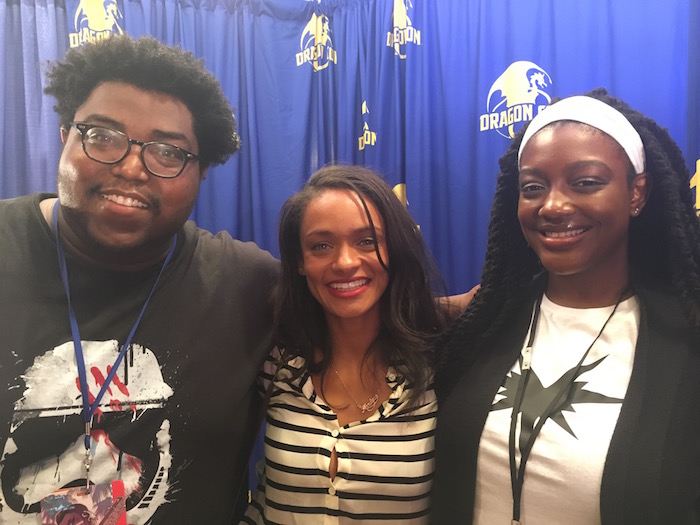We had the opportunity to talk to Kandyse McClure during DragonCon this year. McClure is best known for her role as Anastasia Dualla on Syfy’s 2004 TV series, Battlestar Galactica. But her IMDB is full of great projects since then, too. Check out our conversation, which covered character stereotypes, black people in sci-fi, and what’s next for her.

Blavity: For you doing the Sci-Fi genre (you did it with Battlestar Galactica) how was that? Because oftentimes we’re talking about Sci-Fi it’s all about suspending the disbelief. But when you have black bodies, particularly black women bodies and those spaces, they’re like “now that doesn’t make sense!” They can’t get past that point. So how was it being in that space and acting in that space?
Kandyse McClure: I’d have to say, on the set of Battlestar [Galactica], it was sort of a non-issue. Edward James Olmos made it very clear to the writers and the executive producers that this would always be a diverse show. And that no matter what they did, they had to maintain that diversity. Obviously classism still exists and we saw that in the different colonies. But within each colony, people were very diverse.
I feel like it gravitated toward and had success within the sci-fi and thriller genres because it is this future time where the politics and the issues of current day are suspended. It creates a platform for people to be able to discuss really uncomfortable things because they can say “oh well, in the future…” and they don’t sort of have to take responsibility for their opinions about it right now.
And you can criticize certain aspects of it just even as a woman, never mind a woman of color. That if you’re powerful you have to be sexualized. Or it’s like if you’re dark skinned you have to kick ass and if you’re light skinned you have to be dainty. Whatever it is. But I think Battlestar [Galactica] in particular was able to blur a lot of those lines within the female cast. I mean my character, I had some sweet romantic moments later on. But even in those, I mean, I remember my first sexual scene. I’m getting out of bed, you know, with Apollo. And I leave him lying there. I’ve got to go to work. I get up and I put my clothes on and I’m gone.
I don’t think it was like a conscious thing necessarily like “we’re going to go against the grain!” But it was just this story is powerful enough. We don’t have to add on all these gimmicks to try and catch our audience because we don’t believe that they’ll watch us.
Blavity: What I like about what you said is trusting the audience because oftentimes it’s an excuse, saying, “Oh, they won’t get it,” or, “They won’t understand that,” so we have to keep it as the same and we don’t progress forward. I think it’s very much a cop out when you’re talking about progressing the acting and the storyline forward, by doing that.
KM: It’s one of my greatest pet peeves in this industry. They try and sell you this line about how the audience isn’t “ready for it.” I was told once there’s not going to be an interracial lead. This character is not going to have a girl of color, because the audience isn’t ready for it. Or if you have certain number of ethnicities, doesn’t even have to be one kind, but a group then it becomes an ethnic show. And exactly that, it’s a cop out. I think it’s a cop out. I think the best shows have respect for their audiences and believe them to be intelligent and capable.
Blavity: Are you still filming in Mexico for Persons Unknown?
KM: No, gosh that was ages ago! That was so fun. Too bad about that show. It did not get picked up. You know, oftentimes just because the show is amazing doesn’t mean it gets renewed. That character was so far outside the box of anything that I had ever played and I got to try some really fun things with it. Sort of physically and that kind of stuff. And then living in Mexico for months, that didn’t suck at all. Such high hopes for that show, but on to the next.
Blavity: So what are you working on now? What’s next down the pipeline for you?
KM: I did the thing that nobody should ever do but when you come off a great show. I came off Hemlock Grove and then I decided to kind of change tracks in a way. I wanted to explore some of the other aspects of the work. I also just wanted to do some living for myself. I’ve been an actor for eighteen years, it’s all I did and my whole life was that. And I wanted to just go be a person. Have a relationship, travel to different places, look at other parts of the work.
So I started producing on a really low level. It’s a lot of work, and I cannot call myself a producer, I’m not registered or anything, but I’ve got a couple things on my belt. I started doing more independent film, just things with more of a message. Amazing group of people. All women: Writer, director, camera person, producers on the last film I worked on. It’s called Moving Parts by Emilie Upczak. It’s talking about trafficking through the Caribbean, so that’ll be coming out [at] festival[s] next year. I’ve gotten in touch with some amazing South African directors, working on an experimental film coming up in the year. And I’m producing an environmental documentary with some friends of mine about litter.
A conversation with actress Kandyse McClure of 'Battlestar Galactica' at DragonCon 2016
By Joi Childs • Oct 3, 2016

Photo: Gilbert Flores/Variety via Getty Images